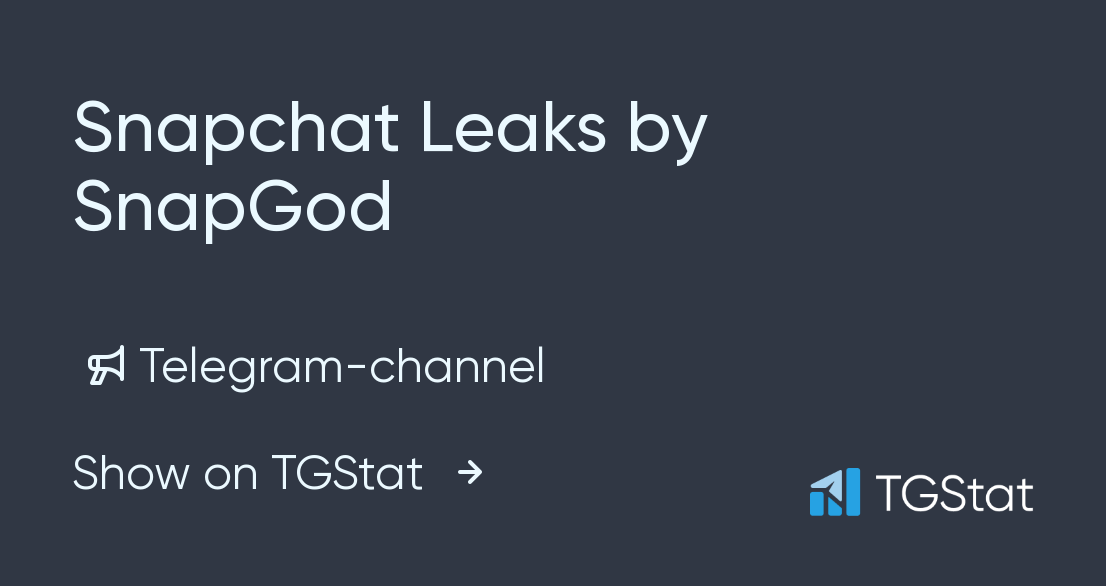Telegram Secrets: Unveiling "[... Snapgod +xyz]" - Find Out!
Is privacy in the digital age a myth, or are we merely navigating a complex landscape of information? The rise of platforms like Telegram and the proliferation of content, both authorized and unauthorized, have created an environment where the line between public and private has become increasingly blurred, posing significant challenges to individual privacy and data security.
The digital world, with its myriad platforms and channels, has become a marketplace of information. From seemingly innocuous interactions to sensitive data transfers, the flow of information is constant. Telegram, in particular, has emerged as a popular platform for various forms of communication, including the sharing of both public and private content. The prevalence of "snapchat leaks," as evidenced by mentions of "snapgod" and associated channels, highlights a concerning trend: the unauthorized dissemination of personal content. This includes references to "leaked albums" and content from platforms like OnlyFans, underscoring the risks involved in the digital sharing of personal information.
| Category | Details |
|---|---|
| Name/Handle | Snapgod (as referenced in context) |
| Associated Platforms | Telegram (primary), Snapchat (implied), potential involvement with other platforms |
| Alleged Activities | Distribution of "snapchat leaks," sharing of "leaked albums," potential involvement with content from OnlyFans |
| Reported Reach | Mentions of channels with thousands of members, indicating a significant audience |
| Monetization (Implied) | Selling access to content (e.g., "just 0.36 per day"), indicating a commercial aspect |
| Contact Methods | Telegram channels and bots (@thesnapgodbot), direct messages |
| Associated Terms | "Leaks," "albums," "fanzleaks," "telegram channel," "snapchat," "download all files" |
| Geographic Reach (Implied) | Global, given the nature of the internet and Telegram |
| Ethical Concerns | Privacy violations, potential copyright infringement, unauthorized distribution of personal content |
| Legal Status | Potentially illegal depending on the nature of the content shared and the laws of relevant jurisdictions |
| Reference Website | Electronic Frontier Foundation (EFF) - For information on digital privacy and related legal and ethical issues. The EFF is a leading non-profit organization defending civil liberties in the digital world. |
The ease with which content can be shared and accessed through platforms like Telegram presents significant challenges. The platforms structure, which allows for the creation of channels and groups with potentially large memberships, facilitates the rapid dissemination of information. This makes it an attractive environment for those seeking to share or access content, even if that content is unauthorized or violates privacy.
The digital landscape is further complicated by the existence of services that facilitate the downloading and distribution of files, such as the "lizzy +folder snapgod +xyz" reference. These services often leverage platforms like Telegram to connect users with content, sometimes at a price. The appeal of these services lies in their purported convenience and low cost, as evidenced by the mention of "just 0.36 per day." This commercial aspect introduces an additional layer of complexity, highlighting the financial incentives that can drive the unauthorized distribution of content.
The use of Telegram channels for the sharing of leaked content has become increasingly prevalent. The mentions of "fanzleaks telegram channel," "snapchat leaks by snapgod telegram channel," and similar references indicate a clear focus on disseminating leaked material. This type of activity raises several ethical and legal concerns. The unauthorized sharing of personal content, especially intimate material, constitutes a significant breach of privacy. Furthermore, the distribution of copyrighted material without permission is illegal.
The terminology used in this context, such as "leaked albums" and the emphasis on "best sellers," suggests a commercial aspect to these activities. It is important to note that the distribution and sale of copyrighted content without authorization are illegal. Individuals involved in these activities may face legal consequences, including civil lawsuits and criminal charges.
The presence of bots, like "@thesnapgodbot," further streamlines the process of accessing and potentially purchasing content. Bots can automate tasks, such as providing links to files, processing payments, and managing subscriptions. This automation makes it easier for individuals to engage in the unauthorized sharing and distribution of content.
The mentions of "Dm me to cheap more" and similar phrases indicate the existence of direct messaging and a possible focus on sales. This suggests a commercial element, where users are encouraged to contact individuals directly for access to content. This creates a potential marketplace for unauthorized material, with all the associated risks.
The context also refers to the availability of "mega 1465gb of snapchat teens leaked telegram channel," a stark example of the types of content being shared. This emphasizes the importance of addressing the issue of unauthorized content distribution on platforms like Telegram. The very nature of the content, if accurately described, raises serious concerns about exploitation and abuse.
The context also touches on the dissemination of content in languages like Hindi. References such as \u091f\u0947\u0932\u0940\u0917\u094d\u0930\u093e\u092e \u0910\u092a \u0915\u0947 \u092e\u093e\u0927\u094d\u092f\u092e \u0938\u0947 \u090f\u0915 \u0938\u0902\u092a\u0930\u094d\u0915 \u0916\u094b\u0932\u0947\u0902; \u0905\u092d\u0940 \u0924\u0915 \u091f\u0947\u0932\u0940\u0917\u094d\u0930\u093e\u092e \u0928\u0939\u0940\u0902 \u0939\u0948? and \u0935\u0947\u092c \u091f\u0947\u0932\u0940\u0917\u094d\u0930\u093e\u092e \u0915\u0947 \u092e\u093e\u0927\u094d\u092f\u092e \u0938\u0947 \u0916\u094b\u0932\u0947\u0902; show the accessibility of content and platforms across linguistic boundaries, emphasizing the global nature of the problem and the importance of multi-lingual efforts in addressing it.
The presence of advertisements such as "Board @ snapgod.tv home @ snapgod.xyz menu @ snapgod.pics" further promotes the content and the network. These are used to create a network of channels and resources related to the content, further embedding the content within the Telegram ecosystem.
The user journey often starts with an invitation, such as "You are invited to a group chat on telegram," which drives users to connect with Telegram and potentially gain access to this kind of content. These invitations, direct messages, and the availability of bots create a complex web of access points.
The constant appearance of these channels and contacts in the context makes one thing clear: users are continually being drawn towards this ecosystem. The reference to "If you have telegram, you can launch snapgod right away" reveals just how easy it is to get involved.
Platforms like Telegram, while offering numerous benefits, have become associated with the distribution of unauthorized content. The references to "snapchat leaks," "leaked albums," and other related content indicate the prevalence of this activity. The implications for privacy, copyright, and personal safety are serious. Addressing these issues requires a multifaceted approach, including platform-level interventions, legal measures, and increased user awareness.
Platforms like Telegram must implement more robust content moderation policies and tools to detect and remove unauthorized content. Proactive monitoring of channels and groups is crucial to identify and shut down those that distribute leaked content or violate copyright. Furthermore, providing users with clear reporting mechanisms can help to combat the spread of unauthorized material.
Legislative and legal frameworks should address the unauthorized sharing and distribution of content. Copyright laws and privacy regulations need to be enforced to deter the sharing of leaked albums or personal information. Legal action against those who share or profit from this type of content can serve as a deterrent.
User education is vital to preventing the spread of unauthorized content. Individuals need to be aware of the risks associated with sharing their personal information online, as well as the legal and ethical implications of accessing or distributing leaked content. Educational campaigns can help people better protect their privacy and make informed decisions about their online activity.
The digital world presents significant challenges to privacy and security. The unauthorized sharing of content, such as "snapchat leaks" and "leaked albums," is a growing concern. By implementing better content moderation, enforcing legal frameworks, and improving user education, we can better protect personal privacy and combat the spread of unauthorized content on platforms like Telegram. The situation is complex, but with a concerted effort, the risks associated with the digital environment can be reduced, leading to a safer and more secure experience for everyone. This also means an increased level of awareness for individuals who may be exposed to leaked or unauthorized material. Individuals need to be aware of the potential legal ramifications of accessing, sharing, or possessing such content. This can include civil lawsuits and potential criminal charges, depending on the nature of the content and the laws in the relevant jurisdictions.
Furthermore, addressing the issue of unauthorized content requires a commitment to the protection of vulnerable groups. Leaked content can often involve intimate or exploitative material. Efforts to protect vulnerable individuals from harm, including the removal of content that depicts child sexual abuse or other forms of exploitation, should be prioritized. This may involve collaboration with law enforcement and organizations that specialize in protecting vulnerable people.
The ongoing evolution of technology necessitates a proactive and adaptive approach to addressing these challenges. As new platforms and technologies emerge, the methods used to share and access unauthorized content will likely evolve as well. Continued monitoring, analysis, and adaptation are essential to staying ahead of these evolving trends. This also includes working with law enforcement and cybersecurity experts to detect new threats and develop effective countermeasures. The goal is to foster a digital environment where privacy and personal safety are better protected.
Moreover, collaboration between platforms, governments, law enforcement, and user communities is crucial to addressing the challenges presented by unauthorized content. Working together, these entities can create a more comprehensive and effective approach to combating the spread of this type of content. It also means collaborating on international standards and best practices to ensure that the response to these issues is consistent and effective across borders. The challenge is significant, but the rewards of a safer and more secure online environment are well worth the effort.
The information provided in this article is for informational purposes only and should not be considered legal or professional advice. Laws and regulations may vary depending on jurisdiction. It is important to consult with appropriate professionals for advice related to specific situations.


